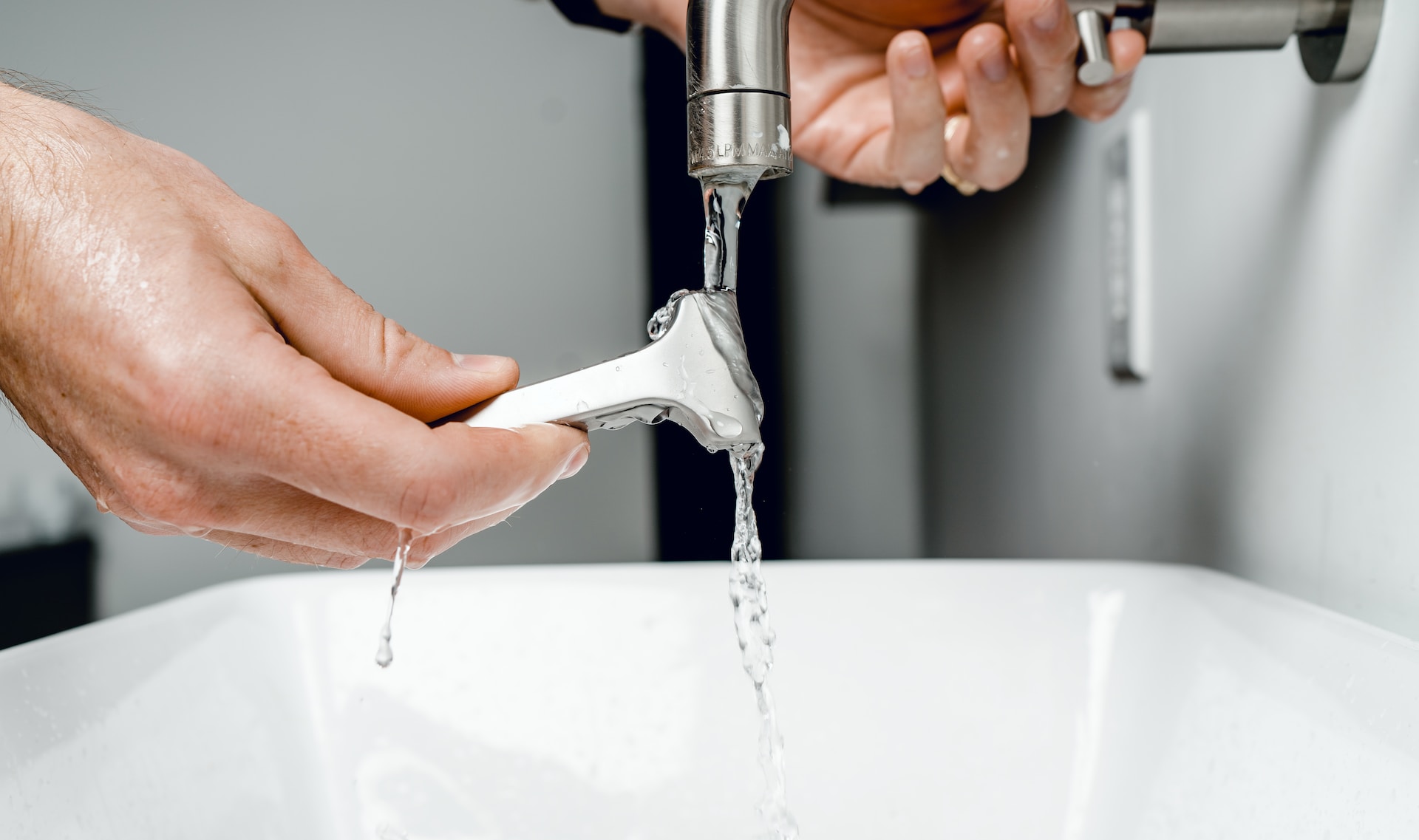Hard water is a common challenge in many households. While not a direct health risk, it can lead to many practical issues, from plumbing problems to negatively impacting your personal hygiene. In this guide, we’ll examine the nuances of hard water–what it is, what it does, and how you can spot it in your home. In our next blog post, we’ll dive deeper into softening solutions for hard water, an area where Reliable Services excels, to address these everyday challenges.
Understanding Hard Water
Hard water is characterized by its high mineral content, primarily calcium and magnesium ions. It typically forms when water flows through deposits of limestone and chalk, which are mainly made up of calcium and magnesium carbonates, before reaching your home. The degree of hardness becomes greater as more of these minerals dissolve.
Calcium is often present in the form of calcium carbonate, a common compound found in rocks like limestone and marble. Magnesium, usually found alongside calcium, often comes from dolomite deposits. These minerals are dissolved into the water as it moves through soil and rock, leading to varying degrees of water hardness depending on the geographical area and the source of the water.
Hard water can significantly affect plumbing, appliances, and daily life. In plumbing systems, it can lead to limescale buildup, a hard, chalky deposit that can clog pipes and reduce the efficiency of boilers and tanks. This buildup not only damages plumbing but also decreases the lifespan of household appliances like washing machines, dishwashers, and water heaters by causing additional wear and tear.
In daily life, hard water can make it difficult to form a lather with soap, leading to increased usage of detergents and soaps. This can result in greater costs for cleaning products. Moreover, when used for washing, hard water can leave mineral deposits on dishes and laundry, resulting in spots on glassware and a stiff, rough texture in fabrics. Additionally, bathing in hard water can lead to skin irritation and dryness for some individuals.
Many households rely on softening solutions for hard water to mitigate these effects. These systems work by exchanging calcium and magnesium ions with sodium or potassium ions, reducing hardness and preventing the associated problems.
Signs of Hard Water
Hard water can present several recognizable signs in a household. Early detection of these signs is crucial as it can prevent long-term damage to appliances and plumbing, reduce additional expenses, and improve overall water quality.
- Visual Indicators: The most noticeable signs of hard water are visual. Homeowners might observe white, chalky limescale deposits on their faucets, showerheads, and tiles. These deposits can also be seen around the drains of sinks and bathtubs. Another visual clue is spotting on glassware and dishes after washing, where water has evaporated and left behind mineral residues.
- Physical Sensations: Hard water often affects the feel of water during daily use. When bathing, the water might feel less effective in lathering soap and shampoo, leading to the need for more products to achieve suds. After showering, your skin may feel dry and itchy, and your hair might appear dull and lifeless due to the minerals in the water affecting the efficacy of soap and shampoo.
- Appliance-Related Indicators: Appliances that use water, such as washing machines, dishwashers, water heaters, and kettles, are particularly susceptible to hard water. Signs include decreased efficiency, increased energy consumption, and a shortened lifespan of these appliances. In washing machines and dishwashers, clothes and dishes may not seem thoroughly cleaned. In kettles and boilers, limescale buildup can become visually noticeable.
Early detection is crucial, as prolonged exposure can lead to severe scaling in appliances and pipes, leading to costly repairs and replacements. If you’re noticing any of these signs, Reliable Services can provide expert advice on how to mitigate these effects and protect your home.
The Impact on Home Plumbing Systems
As mentioned, hard water can be harmful to home plumbing systems. The buildup of calcium and magnesium minerals can lead to several problems, ranging from minor inconveniences to significant long-term damage.
- Mineral Buildup in Pipes: One of the primary effects of hard water on plumbing is the gradual accumulation of mineral deposits inside pipes. These deposits, often called scale, can restrict water flow by narrowing the diameter of the pipes. Over time, this scaling can become severe, leading to noticeably reduced water pressure in showers and faucets. In extreme cases, they can become completely clogged, necessitating costly plumbing interventions.
- Impact on Fixtures: Faucets, showerheads, and valves are prone to buildup, which can affect their performance and appearance, leaving unsightly white, chalky deposits that are difficult to clean. In toilets, hard water can cause rings and stains that are challenging to remove and can affect flushing efficiency.
- Long-Term Damage: The long-term impact of hard water on plumbing systems can be significant. Scale buildup in pipes can lead to increased pressure within the plumbing system, potentially causing leaks or even bursts. This is especially problematic in older homes with less robust plumbing. Moreover, the efficiency of water heaters can be drastically reduced due to scaling, leading to higher energy consumption and, eventually, premature failure. Replacing these fixtures and appliances can be costly, and the constant need for repairs adds up over time.
Therefore, recognizing and addressing hard water issues is crucial for homeowners. Regular maintenance, including descaling fixtures and the implementation of effective softening solutions for hard water, can help mitigate these problems and prolong the lifespan of your home plumbing system.
Fortunately, if you are experiencing trouble with any or all of the above, we can help with that, too! Reliable Services’ expertise in residential plumbing can help address the negative impacts of hard water quickly and effectively.
Appliances at Risk
Hard water poses a significant risk to various water-using appliances in the home due to its high mineral content. These minerals can accumulate, leading to inefficiency, increased energy consumption, and even premature breakdowns.
- Water Heaters: One of the most commonly affected appliances is the water heater. The minerals in hard water can form scale deposits on the heating elements and the interior walls of the heater. This scaling acts as an insulator, reducing the efficiency of heat transfer. As a result, the appliance must work harder and consume more energy to heat the same amount of water, increasing utility bills. Additionally, the buildup can reduce the water heater’s capacity and lifespan.
- Dishwashers and Washing Machines: Dishwashers and washing machines are also vulnerable to hard water. In these appliances, mineral deposits can clog water jets and filters, reducing their effectiveness in cleaning. And since hard water hampers the action of detergents, requiring more soap to achieve the same level of cleanliness, they can, in turn, leave visible residue on your dishes and clothing. Over time, the mineral deposits can damage the internal components of these appliances, leading to costly repairs or replacements.
- Financial Implications: The financial impact of hard water on appliances is twofold. First, there is an increase in operational costs. Devices become less efficient, consuming more electricity or gas, and require more detergent and maintenance. Second, the lifespan of these appliances is significantly reduced due to the constant stress and damage from mineral buildup, leading to more frequent replacements. Considering the high cost of appliances like water heaters, dishwashers, and washing machines, this can amount to a substantial financial burden over time.
Health Concerns
Hard water, while not directly harmful to health, can indirectly affect it, particularly regarding your skin and hair.
- Effects on Skin: Hard water can be harsh on the skin. The minerals in the water can strip away your body’s natural moisture, leading to dryness, irritation, and worsening of conditions like eczema or psoriasis. When bathing or washing with hard water, mineral deposits can form a film on the skin, clogging pores and potentially increasing the risk of skin infections.
- Impact on Hair: Similar to its effects on skin, hard water can also adversely affect hair. Minerals can build up on the scalp and hair strands, making it feel rough and tangled. This buildup can also weigh down your hair, making it look dull and lifeless. Furthermore, since hard water can interfere with the effectiveness of your shampoos and conditioners, it can prevent them from adequately cleaning and conditioning your hair. If you’re one of the 50 percent of Americans experiencing dandruff, hard water may be the culprit, as it can exacerbate common symptoms like dryness and itchiness.
Connection with Soap Scum: Hard water reacts with soap to form soap scum, a residue of soap and minerals. This reaction reduces the soap’s ability to lather and clean effectively, leading to the use of more soap and shampoo to achieve the desired cleanliness. The residue left by soap scum on the skin and hair can contribute to dryness and irritation. In addition, cleaning this scum from bathrooms and plumbing fixtures can be challenging, often requiring more vigorous and frequent cleaning with harsh chemicals, which in turn can contribute to skin irritation.
Navigate Hard Water Challenges with Reliable Services
Mitigating the negative impact of hard water doesn’t have to be a solitary journey. Understanding the signs and effects of hard water is the first step toward a solution. But the real game-changer comes with professional intervention. With expertise in softening solutions for hard water and residential plumbing services, we offer tailor-made remedies for all your water-related concerns.
Visit our website to learn more about how we can help you transform your water quality and protect your home. Say goodbye to hard water woes and hello to clean, soft water with Reliable Services at your side.


